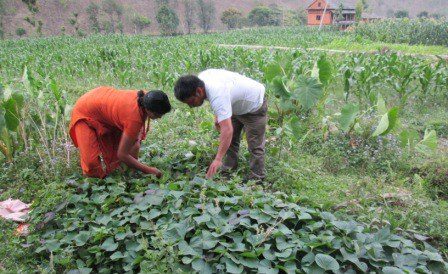
Alleviating Vitamin A Deficiency With OFSPs
Orange Fleshed Sweet Potatoes (OFSPs) have been scientifically proven to be the best source of vitamin A to combat the rapidly rising effects of vitamin A deficiency, one of which being blindness. At Helen Keller, we believe that it is the responsibility of governments, research institutions, and NGOs to encourage farmers to grow Orange Fleshed Sweet Potatoes in order to improve their societies’ nutrition.
The Orange Fleshed Sweet Potato is the only major vegetable that contains four nutrients that exceed 10 percent of their recommended daily amounts, including vitamin A, vitamin C, fiber, and potassium.

The sweet potato was originally considered to be a poor man’s crop in Nepal due to its low input requirements, easy growth, and ability to grow even in poor weather and soil conditions. However, through various research it is clear that sweet potatoes are extremely important to the nutrition and livelihood of Nepali citizens.
Helen Keller introduced OFSPs in Nepal 2007 during the research stage of the Enhanced Homestead Food Production project. A main part of this research was to assess the impact of producing, processing, and consuming OFSPs in relation to the nutrition and livelihood of the communities we were studying. Although OFSPs were new to these communities, farmers were enthusiastic to start growing them. Families were also excited about the rich nutrient value of the leaves of OFSPs.

From September 2014 to February 2015 alone, Helen Keller’s Suaahara program distributed 39,300 OFSP vines to 3006 households. Suaahara has also been conducting food demonstrations with the objective of educating mothers about locally available nutritious foods that are important for children under the age of two. Through these demonstrations, we are teaching these mothers about preparing a wide variety of nutritious foods in addition to proper hygiene habits while preparing and serving meals.




